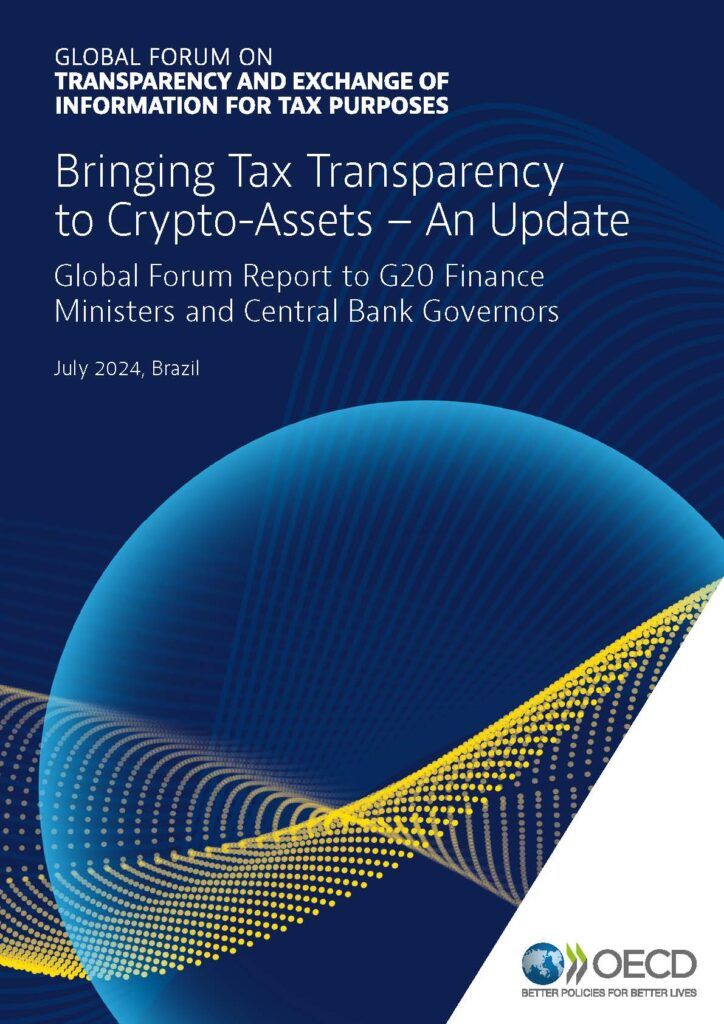25 July 2024

近年、暗号資産市場は急速に拡大しています。この革新的な分野の成長は、新たな経済機会やビジネス手法を生み出す一方で、納税者(個人や法人)が所得や資産を税務当局や規制当局から隠す手段を増やしています。これは、暗号資産の利用が従来の金融機関や金融商品を離れる動きを促進しているためです。
暗号資産やその利用を支援する仲介業者は、金融活動作業部会(FATF)による規制強化の取り組みを受け、徐々に規制対象になりつつあります。しかし、納税者がオフショアの仲介業者を通じて暗号資産を保有する場合、脱税や税務上の義務回避のリスクが特に深刻です。海外で行われる金融活動に関連する情報を把握することは、納税者の居住国の税務当局にとって大きな課題となっています。
この課題に対応するため、OECDは2014年にG20諸国と協力し、共通報告基準(CRS)を開発しました。CRSでは、金融機関が管理する金融口座の受益者情報を含む、自動的な情報交換(AEOI)を導入しています。しかし、暗号資産について同様の透明性が確保されていない場合、一部の納税者が暗号資産への投資を選び、不平等を悪化させる可能性があります。その結果、政府の歳入が減少し、重要な公共サービスの資金が不足するほか、脱税や租税回避が進む恐れがあります。また、暗号資産セクターに競争上の優位性をもたらし、金融市場に歪みを生じさせる可能性もあります。
こうした状況を受け、OECDはG20諸国と連携し、暗号資産報告フレームワーク(CARF)を策定しました。CARFは、税務当局間の自動情報交換を暗号資産セクターに拡大し、オフショアで保有される暗号資産や関連所得の情報を取得できる仕組みを提供することを目的としています。これにより、各国の税務当局は国内規則に従い、適切な課税を実施できるようになります。結果として、すべての国が不平等に対処し、公共サービスのための財源を確保できるようになります。
CARFの開発はG20によって強く支持されており、税務目的の透明性と情報交換を推進する「グローバル・フォーラム」に、その実施を促進する役割が託されています。このフォーラムは、すでにCRSの実施を成功させた経験を持ち、CARFにおいても同様の進展が期待されています。現在、この取り組みは大きく進展しており、2024年末までに、グローバルなスケジュールを含む具体的なコミットメントプロセスが完了する予定です。
この報告書は、この作業の最新情報を提供するものであり、2024年7月に開催されたG20財務大臣・中央銀行総裁会議での議論のために、G20ブラジル議長国の要請によりグローバル・フォーラム事務局が作成したものです。
原文
Abstract
This report looks back at 15 years of tax and development work at the OECD charting the evolution of the OECD’s engagement with, and inclusion of, developing countries in its tax work from 2009 to 2024. Beginning with the restructuring of the Global Forum on Transparency and Exchange of Information for Tax Purposes in 2009, through the BEPS Actions, the establishment of the Inclusive Framework on BEPS and negotiations on the Two Pillar Solution to Address the Tax Challenges of the Digitalising Economy, it shows how OECD initiatives have combined the momentum for multilateral tax co-operation with the increased focus on taxation in international development, to develop a range of tools, instruments and forums with wide participation from developing counties. Accompanying the move to multilateralism in tax matters, the OECD has also sought to increase the availability of data on taxation, for example through the Global Revenue Statistics Database, and support more integrated tax and development policy thinking, for example on the taxation of development assistance. Concurrently there has been a continuous growth in the OECD capacity building activities, now reaching over 30,000 officials in over 100 countries annually. Notable among these initiatives is the groundbreaking joint OECD/UNDP Tax Inspectors Without Borders initiative. The report features several case studies highlighting the impacts across various countries, as well as the wide range of partnerships forged by the OECD to harness taxation’s potential in advancing sustainable development.
Executive summary
The crypto-asset market has grown rapidly over recent years. The growth in this innovative sector brings with it new economic opportunities and ways of doing business, as well as new ways for taxpayers (individuals and entities) to hide their income and wealth from the view of tax authorities and other regulators. This is because the increased use of crypto-assets involves a move away from more traditional financial institutions and financial products that have historically been the focus of regulation and tax reporting. Crypto-assets and the intermediaries that facilitate their use are only now becoming a focus of regulation through an increased emphasis on crypto-assets by the Financial Action Task Force (FATF). The risks in relation to the use of crypto-assets as a means to evade and avoid tax obligations are particularly acute when taxpayers hold the crypto assets offshore, such as through offshore intermediaries. Where financial activities that are relevant for tax purposes take place offshore, it is especially difficult for tax authorities from the jurisdictions in which taxpayers are resident to have visibility over the offshore income and wealth of their taxpayers to ensure that it is properly declared and taxed. This led to the development of the Common Reporting Standard (CRS), by the OECD working with G20 countries in 2014, which introduced the automatic exchange of information (AEOI) between tax authorities for tax purposes in relation to financial accounts maintained by the traditional financial sector, including information on the beneficial owners of financial accounts. If tax administrations do not have the same visibility in relation to crypto-assets, it will create incentives for some taxpayers to move their investments to crypto-assets, resulting in tax evasion and avoidance risks that exacerbate inequality, threaten to reduce the revenues available to governments to fund vital public services and undermine the trust the public has in public institutions and the financial system. It will also create distortions in financial markets, as it provides the crypto-asset sector with a competitive advantage compared to the more traditional financial sector. The issue of crypto-assets has therefore received increasing public attention, in developing and developed jurisdictions alike, alongside an increased focus by political leaders and law enforcement authorities. To address the tax evasion and avoidance risks created by the increased use of crypto assets at an international level, the OECD has worked with G20 countries to develop the Crypto-Asset Reporting Framework (CARF). The CARF is a framework to extend AEOI between tax authorities to the crypto-asset sector. This is to ensure that tax authorities from all jurisdictions are equipped with the information they need, including information on the beneficial ownership of crypto-assets, to properly subject the income and wealth held offshore to tax, in accordance with their jurisdiction’s domestic rules. This will help all jurisdictions address inequality and fund public services. The development of the CARF was strongly endorsed by the G20, which invited the Global Forum on Transparency and Exchange of Information for Tax Purposes (the Global Forum) to work to ensure the widespread implementation of the CARF around the globe. Having already delivered a commitment and monitoring process that has led to the widespread implementation of the CRS, the Global Forum is well placed to do the same in relation to the CARF. The Global Forum has already made significant progress in this work and is due to deliver its commitment process, including commonly expected timelines, by the end of 2024. This report provides an update on this work. It has been prepared by the Secretariat of the Global Forum to inform the discussions at the July 2024 meeting of the G20 Finance Ministers and Central Bank Governors, at the request of the G20 Brazilian Presidency.

